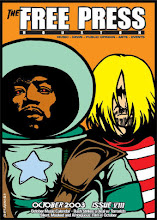The Limits of Control

The Limits of Control snuck into town (playing at the Landmark River Oaks) and will probably be gone by the time its run is brief. Make plans to check it out if you consider yourself a savvy filmgoer because this latest film from Jim Jarmusch displays arthouse smarts to spare.
The story repeats itself like a cinematic rhyme. Each scene apes the previous scene in terms of action and dialogue with the main character the only constant factor. The form is minimalist, the music features feedback droning guitar sounds, the cinematography of Christopher Doyle is precise. Some shots outside a railroad car window suggest digital manipulation.
In many ways Limits of Control feels like old school arthouse as opposed to more accessible arthouse fare like the neo-classical style of Soderbergh in Girlfriend Experience or Sam Mendes with the hip breezy Away We Go. The audiences for all of the mentioned films is small but devoted. In the case of Jarmusch the audience will be tested perhaps to the limits of their endurance.
For The Limits of Control it's like Jarmusch wanted to stay in the Ghost Dog lane but also instill the sense of a stern almost authoritative hand not found in early works like Down By Law or Dead Man. The mission once completed doesn't really satisfy on a narrative scale. In fact there's a brief scene right before the protagonist, a taciturn liquidator known as the Lone Man (Isaach De Bankolé who is somewhat of a regular cast member in Jarmusch films), assassinates his assignment that suggest he may be imaging the scene we're observing and in fact has only killed a femme (Paz de la Huerta) who we see lying naked on a bed as Lone Man pulls the sheets over her head. Her character (simply credited as Nude) is the only supporting player that appears more than once. Everyone else - Bill Murray, Gael García Bernal, John Hurt, Tilda Swinton, there are others - show up for one dialogue scene only. (There is a brief shot of Swinton after her one sequence but she doesn't talk.) Of course such prognostication can only be fueled by filmmaking of a highly subjective point of view.
I felt challenged by The Limits of Control and mustered much of my previous movie going acumen to rise to the level of intellectual comfort Jarmusch was trying to provide.










